Abyssinian cats are among the most ancient and captivating cat breeds, known for their unique appearance and engaging personalities. These fascinating felines have captivated cat lovers for centuries and continue to thrive as beloved companions. In this comprehensive guide, we will explore the history, appearance, personality traits, and care requirements of the Abyssian cat, showcasing what makes them such a popular choice for pet owners worldwide.
Short Summary
- Abyssinian cats are an ancient breed originating in Southeast Asia and the Indian Ocean, known for their distinct coat colors & ticked patterns.
- They have active, intelligent personalities, making them ideal pets for multi-pet households.
- Proper care includes grooming needs, balanced diet & exercise opportunities to ensure health and well-being.
The Origins of the Abyssinian Cat
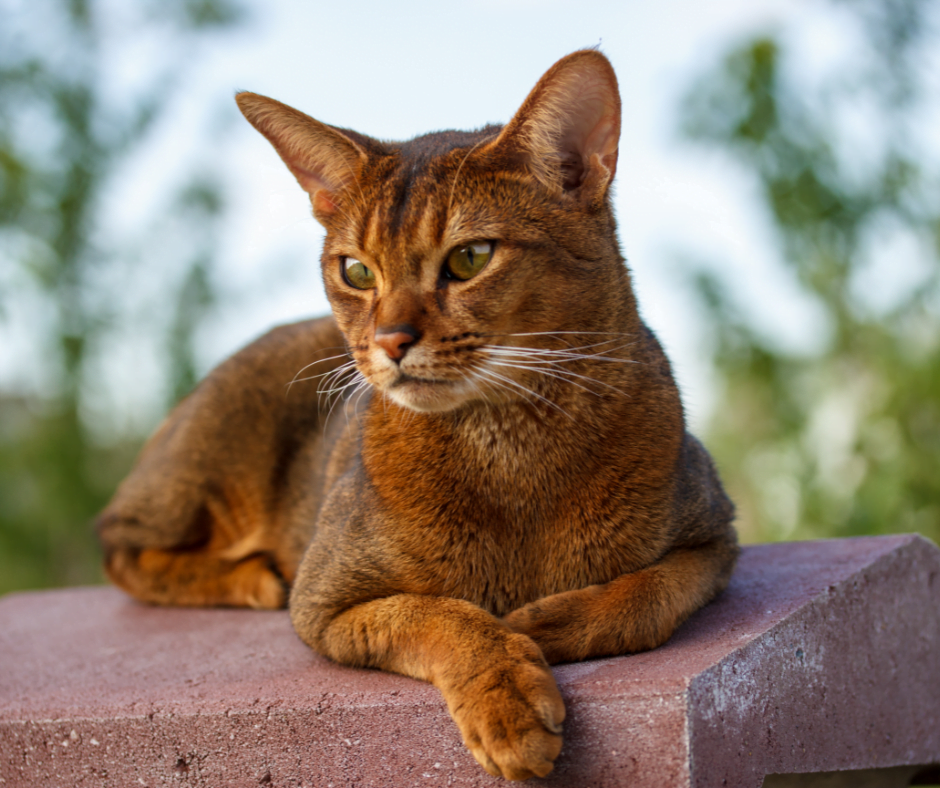
The Abyssian cat is an ancient breed, likely originating in Southeast Asia and the Indian Ocean. The name “Abyssinian” is attributed to this breed in relation to the Abyssinian War, and several cats from that era were brought to Europe by colonialists. The earliest known example of an Abyssian cat is a taxidermal exhibit acquired by a museum supplier between 1834 and 1836.
The first Abyssinian cats were imported to Europe in the 1870s and quickly gained popularity on the continent. The breed was introduced to North America in the 1900s, and its popularity surged in the 1930s. Despite the devastation of World War II, which left only a dozen or so Abyssinian cats in Europe, the breed made a remarkable recovery due to imports to the United States.
Today, Abyssinians are cherished as one of the most popular cat breeds worldwide.
The Distinctive Appearance of Abyssinian Cats
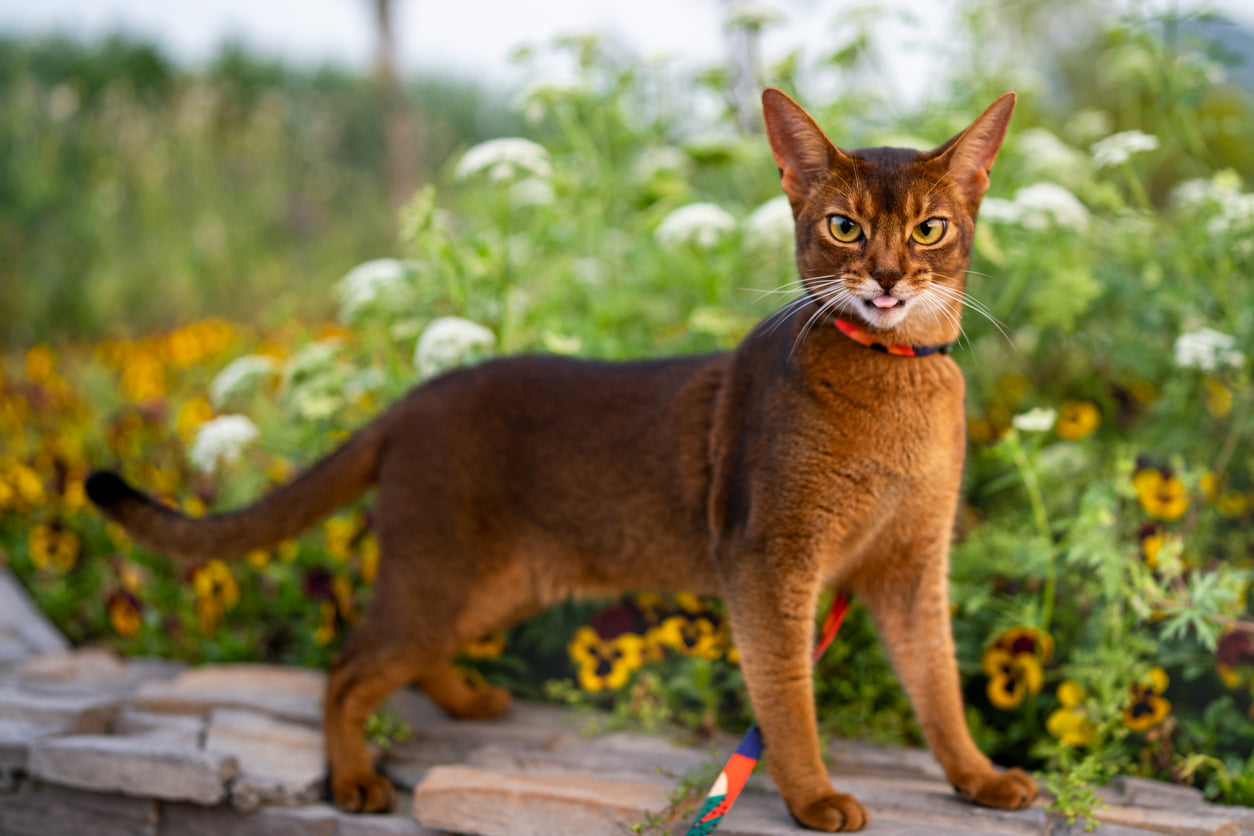
Abyssinian cats are known for their distinctive appearance, featuring a short, dense coat with unique colors and patterns and eyes that come in green or gold. These medium-sized cats have a muscular build, large ears, and almond-shaped eyes, giving them an exotic yet elegant look.
In the following subsections, we will delve deeper into the coat colors and patterns as well as the eye colors that define the Abyssian breed.
Coat Colors and Patterns
The coat of an Abyssian cat is ticked, which signifies alternating dark and light spots. The primary hues of the fur are composed of distinct bands of color along each individual hair, with the coat appearing darker along the spinal line. The body color is muted and lightened. This extends to the underneath of the cat’s neck, its undersurface, and the inside of its legs. Abyssian cats have four main coat colors – ruddy brown, red, blue, and fawn. They are very distinctive-looking cats with a unique appearance.
In addition to the four primary coat colors, there is a distinct group of Abyssinians known as Silver Abyssinians, which encompass silver colors. The diverse range of colors and ticked patterns make the Abyssian’s coat truly mesmerizing and set them apart from other cat breeds.
Eye Colors
The eyes of Abyssinian cats come in an enchanting array of hues, including hazel, green, or gold. Their almond-shaped eyes not only add to their striking appearance, but also showcase their intelligence and curiosity.
The combination of their eye colors and coat patterns creates a mesmerizing, exotic look that is truly unique to the Abyssian breed.
Personality Traits of Abyssinian Cats
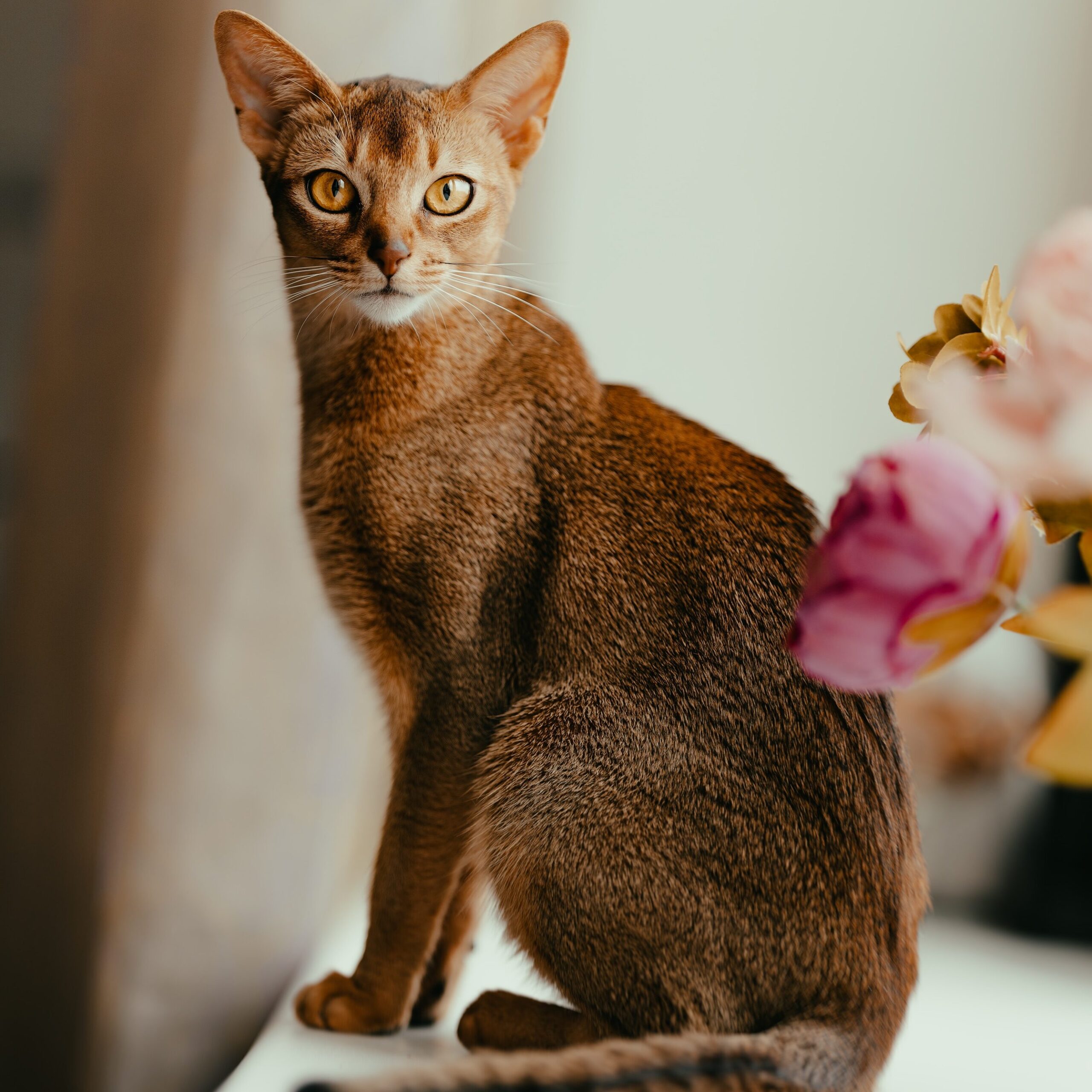
Abyssinian cats are renowned for their active, intelligent, curious, and companionable personalities. Their high energy levels and playful nature make them engaging pets that thrive in interactive environments. While Abyssinians are not typically lap cats, they prefer to curl up beside you rather than on top of you, showing their affection in their own way.
These social cats form strong bonds with their human companions and enjoy the company of other pets, making them an ideal choice for multi-pet households. Abyssinians are known for their dog-like behaviors, such as following their owners around the house and even being trained to walk on a leash outside with appropriate supervision.
Their unique combination of intelligence, curiosity, and loyalty makes the Abyssian cat a truly special companion.
Caring for Your Abyssinian Cat
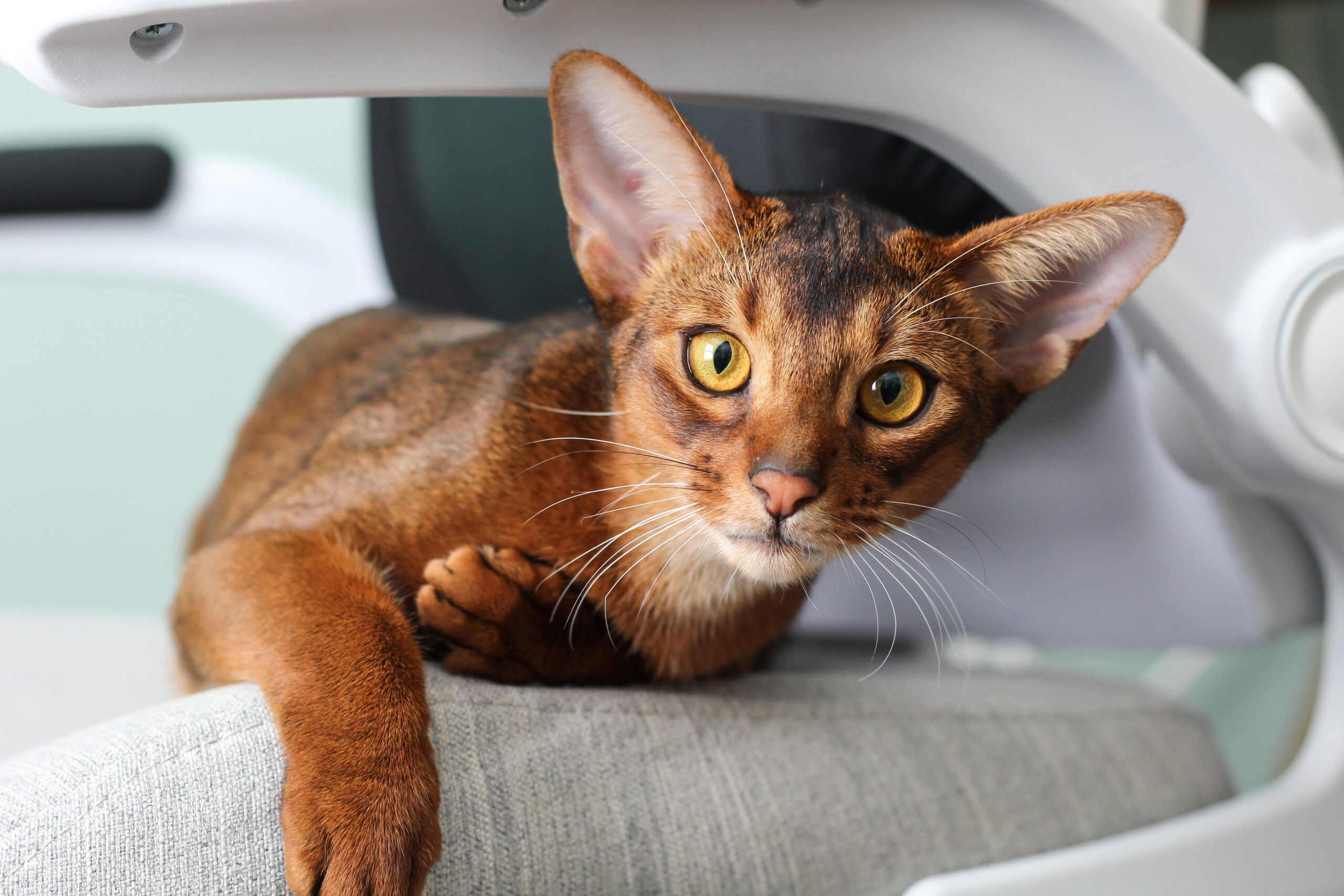
Caring for an Abyssinian cat involves attention to their grooming needs, a balanced diet, and providing exercise and mental stimulation. These aspects are crucial in maintaining the health and happiness of your Abyssinian cat.
In the following subsections, we will delve into the specific grooming needs, diet, and exercise requirements of this unique breed.
Grooming Needs
Abyssinian cats have a short, dense coat that sheds minimally, requiring weekly grooming with a stainless steel comb to remove dead hair and occasional baths to remove dander. Regular grooming not only helps maintain the health and appearance of their coat but also strengthens the bond between you and your cat.
In addition to coat maintenance, Abyssinians require a weekly ear inspection to ensure their overall health. Proper oral hygiene is essential for Abyssian cats, as they are prone to periodontal disease. Daily brushing with a toothbrush and toothpaste specifically designed for cats is recommended, but even brushing once per week can help protect your cat from dental issues.
Establishing a regular grooming routine will ensure that your Abyssian cat remains healthy and happy.
Diet and Nutrition
Providing a balanced and nutritious diet is crucial for the overall health and well-being of your Abyssinian cat. Factors such as age, sex, and activity levels should be taken into account when determining the appropriate diet for your cat. It is essential to choose high-quality cat food that meets the specific nutritional needs of the Abyssian breed.
For Abyssinian kittens, Purina Pro Plan True Nature Kitten Grain Free Natural Chicken & Egg Recipe is suggested. It is important to avoid overfeeding your cat, as obesity can lead to a variety of health issues. Regular veterinary check-ups and consultations with your vet will help you monitor your cat’s weight and adjust their diet accordingly.
Exercise and Mental Stimulation
Abyssinian cats require interactive playtime to maintain their physical and mental well-being. Providing a variety of toys, including puzzle toys that test their intelligence, can help meet their exercise and mental stimulation needs. Provide cats with high perches and cat trees. This will allow them to satisfy their urge to jump and climb.
Training your Abyssinian to walk on a leash outside, with appropriate supervision, can offer additional exercise and mental stimulation. Ensuring your cat has ample opportunities for physical activity and mental engagement will not only help them maintain a healthy weight, but also contribute to their overall happiness and well-being.
Common Health Issues in Abyssinian Cats
Abyssinian cats, like any other breed, can be prone to certain health issues. Common health problems in Abyssinians include pyruvate kinase deficiency, periodontal disease, and progressive retinal atrophy. Pyruvate kinase deficiency is a condition caused by an individual’s lack of the enzyme pyruvate kinase in red blood cells. It can cause various issues, such as anemia, weakness, and muscle wasting.
Periodontal disease is a gum disease that can affect cats. Abyssinians are particularly vulnerable to it. Cat’s gums and teeth can suffer progressive inflammation. Such an inflammation compromises the support system of the tooth.
Progressive retinal atrophy is a common health issue in Abyssinian cats, with a prevalence of 45% in cats aged 2 years or older, as reported in a study by the National Center for Biotechnology. Regular veterinary check-ups and proper care can help prevent or manage these health issues in your Abyssinian cat.
Choosing and Adopting an Abyssinian Cat
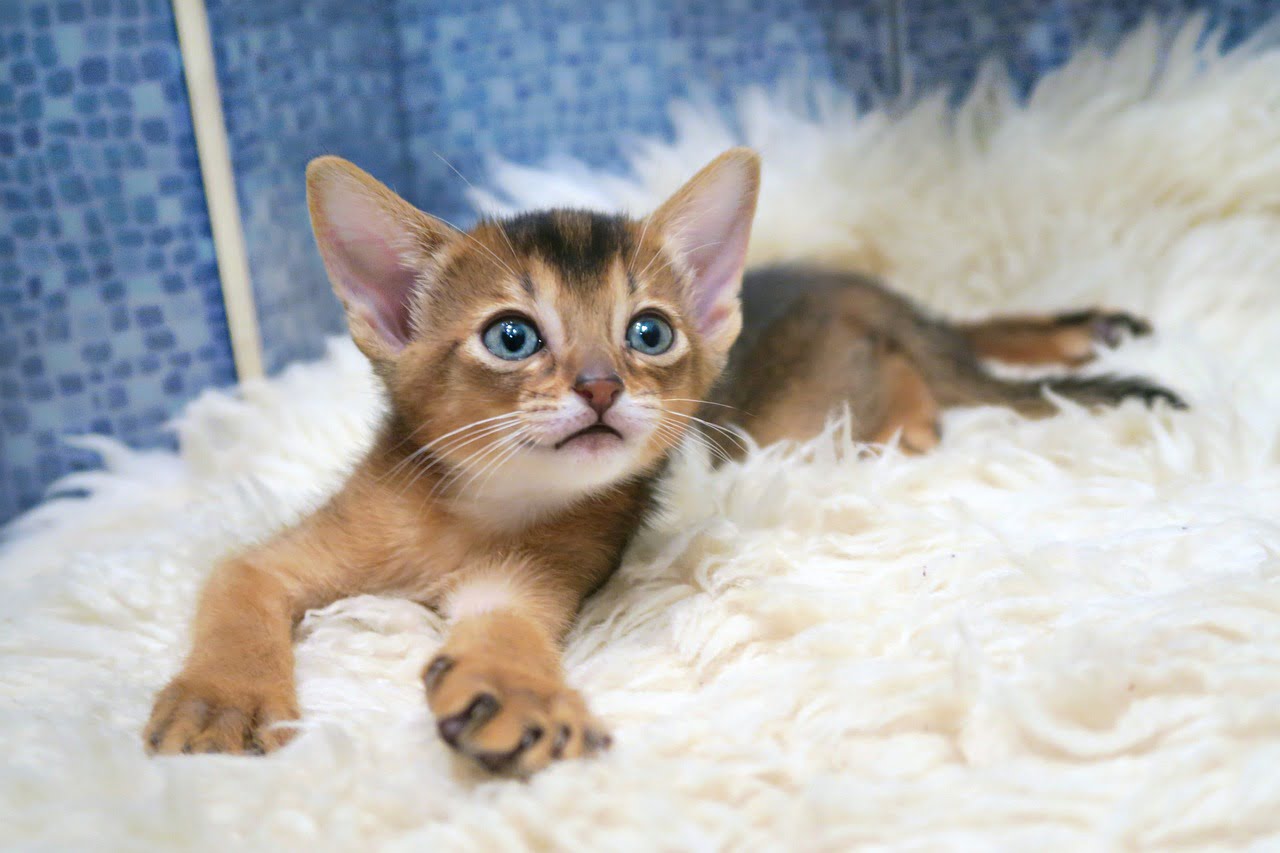
When considering adding an Abyssinian cat to your family, it is essential to investigate dependable breeders or adoption through a rescue that focuses on Abyssinians. Researching reputable breeders or rescue groups will ensure that you are adopting a healthy and well-cared-for cat. Be aware of any red flags, such as numerous cats on the premises or cats in a state of ill-health, when selecting a breeder. Under no circumstances should a breeder be permitted to ship a cat to your residence or accept payment electronically.
Alternatively, you may wish to explore rescue groups located in your vicinity or utilize pet search sites such as Petfinder.com. Whether you choose to adopt from a breeder or a rescue group, it is important to be prepared to provide your Abyssinian with a loving home that meets their unique needs, including a stimulating environment and companionship.
Abyssinian Cats and Family Life
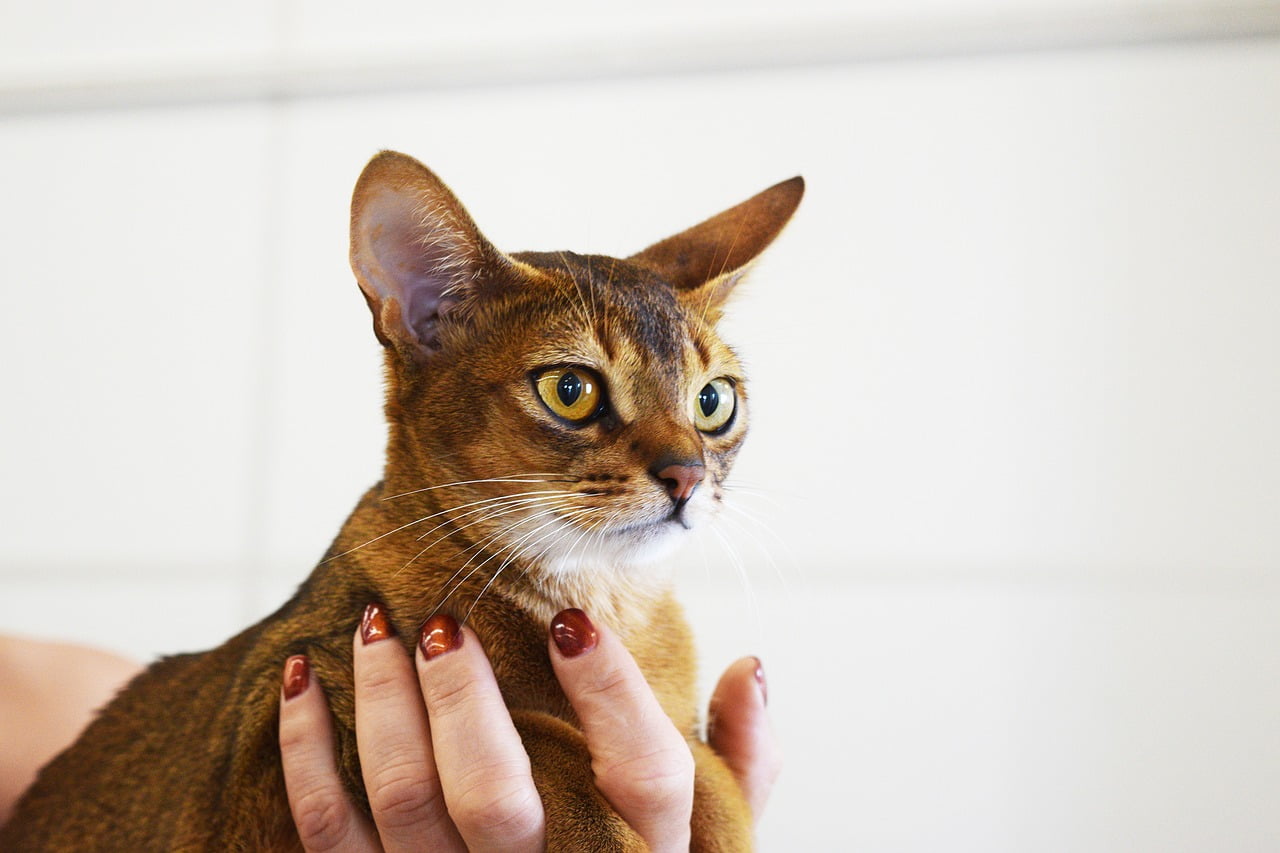
Abyssinian cats are well-suited for family life due to their athletic and loyal nature, and they will happily interact with children. Their energetic demeanor and patience when playing with children make them an ideal choice for families with young ones.
Abyssinians are known to be sociable and thrive on companionship, whether it be with a human or another pet. Providing an environment that encourages socialization and play will help your Abyssian cat flourish as a beloved member of your family.
The Role of Abyssinian Cats in Popular Culture
Abyssinian cats have made their mark in popular culture, appearing in various works of literature, movies, and television shows. For example, the novel “The Cat Who Came in from the Cold” by Peter Gethers features an Abyssinian cat as a central character. Their distinctive appearance and engaging personalities have captured the imagination of authors and screenwriters alike.
In movies, Abyssinian cats have starred in films such as “The Cat from Outer Space” and made appearances in popular television shows like “Friends.” The presence of Abyssinian cats in popular culture further showcases their unique charm and appeal, solidifying their status as a beloved and captivating breed.
Summary
In conclusion, the Abyssian cat is a captivating and ancient breed with a distinctive appearance and engaging personality traits. Their unique coat colors and patterns, along with their lively, loyal, and intelligent nature, make them a popular choice among cat lovers worldwide. Proper care, including grooming, diet, exercise, and mental stimulation, is essential in maintaining the health and happiness of your Abyssinian cat. Whether you are considering adopting an Abyssian or already share your life with one, understanding and appreciating their unique qualities will undoubtedly deepen the bond between you and your feline companion.
Frequently Asked Questions
What is special about Abyssinian cats?
With their loyal and affectionate personalities, abyssinian cats are the perfect companions. They enjoy playing and being active, as well as curling up for cuddle time.
Plus, with their beautiful coat and striking features, they add a dash of elegance to any home.
Are Abyssinian cats expensive?
Abyssinian cats can be quite expensive, with breeders often charging between $1,200 and $2,400 for a single cat. Additionally, certain traits can cause prices to increase even further.
Therefore, if you are looking to purchase an Abyssian cat, it is important to factor in the potential cost.
Can you leave an Abyssinian cat alone?
Generally speaking, Abyssian cats don’t do well if left home alone for long periods of time. While they can usually tolerate short absences, it is not recommended to leave them unattended for extended lengths of time. This could have an adverse effect on their health and well-being.
Are Abyssinian cats low maintenance?
Overall, Abyssinian cats are low maintenance and don’t require too much in terms of grooming or special care. As with any pet, they need regular exercise, quality nutrition, and lots of love, attention, and playtime.
Proper hygiene such as weekly ear cleaning and occasional baths are necessary to keep them healthy and happy.
Do Abyssinian cats like to be held?
Though Abyssinian cats may be hesitant to be held, they are very affectionate and love to spend time with their owners. They enjoy being around people and can quickly become bored if left alone for too long.
With patience and understanding, these cats can learn to enjoy being held and cuddled.
